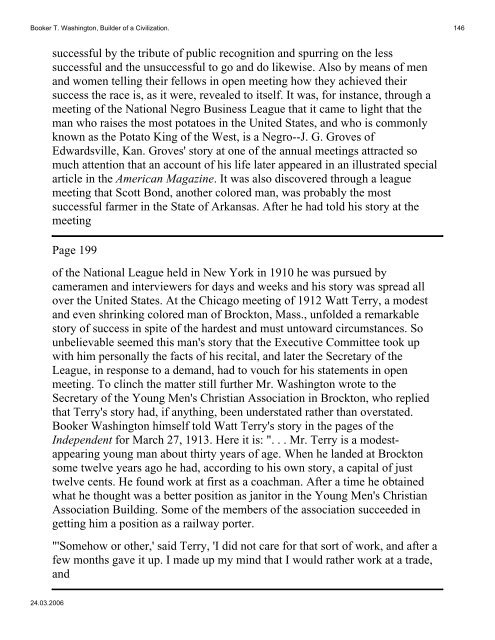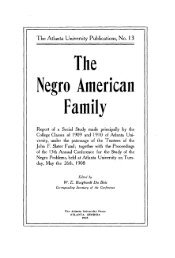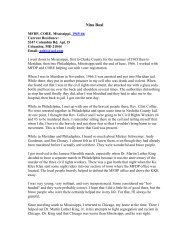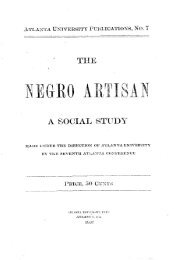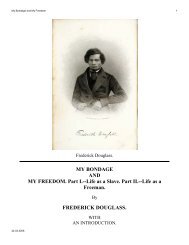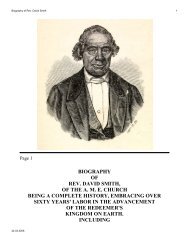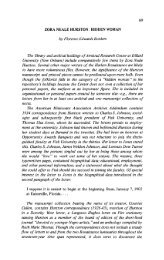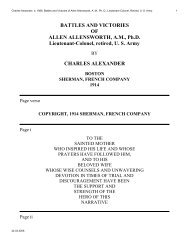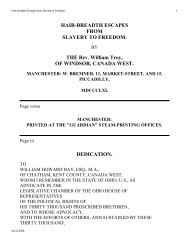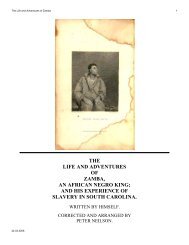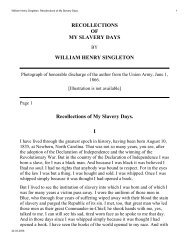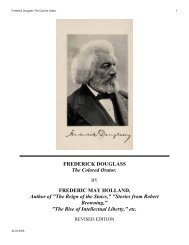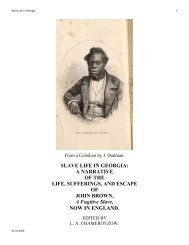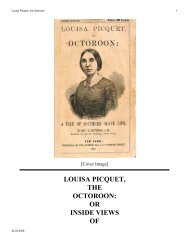Booker T. Washington, Builder o - African American History
Booker T. Washington, Builder o - African American History
Booker T. Washington, Builder o - African American History
Create successful ePaper yourself
Turn your PDF publications into a flip-book with our unique Google optimized e-Paper software.
<strong>Booker</strong> T. <strong>Washington</strong>, <strong>Builder</strong> of a Civilization. 146<br />
successful by the tribute of public recognition and spurring on the less<br />
successful and the unsuccessful to go and do likewise. Also by means of men<br />
and women telling their fellows in open meeting how they achieved their<br />
success the race is, as it were, revealed to itself. It was, for instance, through a<br />
meeting of the National Negro Business League that it came to light that the<br />
man who raises the most potatoes in the United States, and who is commonly<br />
known as the Potato King of the West, is a Negro--J. G. Groves of<br />
Edwardsville, Kan. Groves' story at one of the annual meetings attracted so<br />
much attention that an account of his life later appeared in an illustrated special<br />
article in the <strong>American</strong> Magazine. It was also discovered through a league<br />
meeting that Scott Bond, another colored man, was probably the most<br />
successful farmer in the State of Arkansas. After he had told his story at the<br />
meeting<br />
Page 199<br />
of the National League held in New York in 1910 he was pursued by<br />
cameramen and interviewers for days and weeks and his story was spread all<br />
over the United States. At the Chicago meeting of 1912 Watt Terry, a modest<br />
and even shrinking colored man of Brockton, Mass., unfolded a remarkable<br />
story of success in spite of the hardest and must untoward circumstances. So<br />
unbelievable seemed this man's story that the Executive Committee took up<br />
with him personally the facts of his recital, and later the Secretary of the<br />
League, in response to a demand, had to vouch for his statements in open<br />
meeting. To clinch the matter still further Mr. <strong>Washington</strong> wrote to the<br />
Secretary of the Young Men's Christian Association in Brockton, who replied<br />
that Terry's story had, if anything, been understated rather than overstated.<br />
<strong>Booker</strong> <strong>Washington</strong> himself told Watt Terry's story in the pages of the<br />
Independent for March 27, 1913. Here it is: ". . . Mr. Terry is a modestappearing<br />
young man about thirty years of age. When he landed at Brockton<br />
some twelve years ago he had, according to his own story, a capital of just<br />
twelve cents. He found work at first as a coachman. After a time he obtained<br />
what he thought was a better position as janitor in the Young Men's Christian<br />
Association Building. Some of the members of the association succeeded in<br />
getting him a position as a railway porter.<br />
"'Somehow or other,' said Terry, 'I did not care for that sort of work, and after a<br />
few months gave it up. I made up my mind that I would rather work at a trade,<br />
and<br />
24.03.2006


